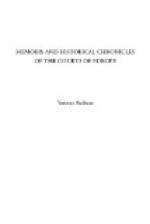Accordingly I found him there, attended by a number of his people, who appeared to be true Flemings, and to have all the rusticity and unpolished manners of their country. The Bishop was of the House of Barlemont, one of the principal families in Flanders. All of this house have shown themselves Spaniards at heart, and at that time were firmly attached to Don John. The Bishop received me with great politeness and not a little of the Spanish ceremony.
Although the city of Cambray is not so well built as some of our towns in France, I thought it, notwithstanding, far more pleasant than many of these, as the streets and squares are larger and better disposed. The churches are grand and highly ornamented, which is, indeed, common to France; but what I admired, above all, was the citadel, which is the finest and best constructed in Christendom. The Spaniards experienced it to be strong whilst my brother had it in his possession. The governor of the citadel at this time was a worthy gentleman named M. d’Ainsi, who was, in every respect, a polite and well-accomplished man, having the carriage and behaviour of one of our most perfect courtiers, very different from the rude incivility which appears to be the characteristic of a Fleming.
The Bishop gave us a grand supper, and after supper a ball, to which he had invited all the ladies of the city. As soon as the ball was opened he withdrew, in accordance with the Spanish ceremony; but M. d’Ainsi did the honours for him, and kept me company during the ball, conducting me afterwards to a collation, which, considering his command at the citadel, was, I thought, imprudent. I speak from experience, having been taught, to my cost, and contrary to my desire, the caution and vigilance necessary to be observed in keeping such places. As my regard for my brother was always predominant in me, I continually had his instructions in mind, and now thought I had a fair opportunity to open my commission and forward his views in Flanders, this town of Cambray, and especially the citadel, being, as it were, a key to that country. Accordingly I employed all the talents God had given me to make M. d’Ainsi a friend to France, and attach him to my brother’s interest. Through God’s assistance I succeeded with him, and so much was M. d’Ainsi pleased with my conversation that he came to the resolution of soliciting the Bishop, his master, to grant him leave to accompany me as far as Namur, where Don John of Austria was in waiting to receive me, observing that he had a great desire to witness so splendid an interview. This Spanish Fleming, the Bishop, had the weakness to grant M. d’Ainsi’s request, who continued following in my train for ten or twelve days. During this time he took every opportunity of discoursing with me, and showed that, in his heart, he was well disposed to embrace the service of France, wishing no better master than the Prince my brother, and declaring that he heartily despised being under the command of his Bishop, who, though his sovereign, was not his superior by birth, being born a private gentleman like himself, and, in every other respect, greatly his inferior.




